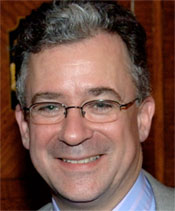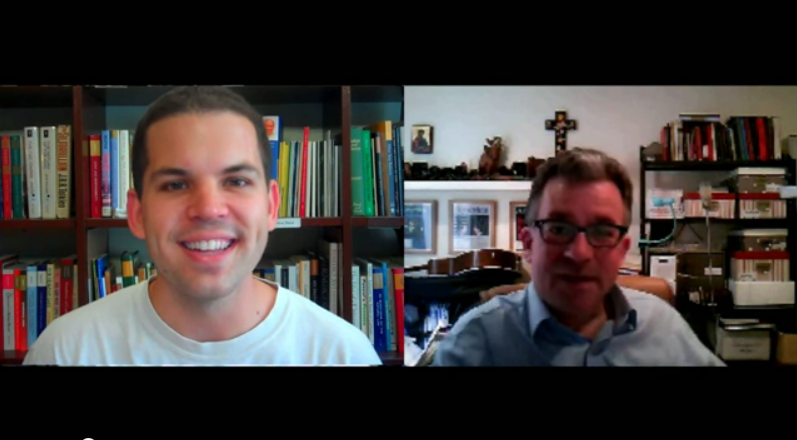If you’re like me, you’re regularly confronted with objections to Church teaching on several hot-button issues. You know the usual culprits: same-sex marriage, abortion, contraception, the sexual-abuse crisis, the male-only priesthood, AIDS in Africa.
And a lot of the time, I find myself tongue-tied. I understand the Church’s position intellectually, but when I try to share it I come across as bumbling, caustic, defensive, or all three.
 That’s why I love Austen Ivereigh’s new book and have been recommending it every chance I get. I’ve already suggested it to several friends, I’ve reviewed it here on the blog, and I’ve even mentioned it twice on the radio. I really think How to Defend the Faith Without Raising Your Voice: Civil Responses to Catholic Hot-Button Issues is simply the right book at the right time, and I’m convinced it can help any Catholic to articulate the faith with more clarity and grace.
That’s why I love Austen Ivereigh’s new book and have been recommending it every chance I get. I’ve already suggested it to several friends, I’ve reviewed it here on the blog, and I’ve even mentioned it twice on the radio. I really think How to Defend the Faith Without Raising Your Voice: Civil Responses to Catholic Hot-Button Issues is simply the right book at the right time, and I’m convinced it can help any Catholic to articulate the faith with more clarity and grace.
The book is especially relevant to the world of new media. In a place where the buttons are extremely hot and the responses typically less than civil, the book shows any comment-box apologist or Facebook debater how to shed more light than heat.
Austen recently sat down with me to discuss several things including his new book, his media apologetics group, Catholic Voices, and some simple strategies every Catholic can use to defend the faith calmly and persuasively.
Watch or download our interview below:
(Sorry for the Skype hiccups during the third question. Austen gave such a great answer, and because I think it will *really* help people, I’ve transcribed the whole thing below in the Excerpt section.)
Video
Audio
Download the mp3 here (12 minutes)
Topics Discussed:
1:24 – How did Catholic Voices come about and what is its mission?
3:56 – What is the principle of ‘positive intention’ and how does it work?
5:10 – Re-framing criticism of the Catholic Church
7:57 – How can we charitably defend the Church’s teachings on homosexuality and same-sex marriage?
9:45 – The real reason the Catholic Church opposes secular same-sex marriage

Excerpt
Q: Using your principle of ‘positive intention,’ and your work through Catholic Voices, what are some simple ideas or points that Catholics can communicate in order to get across the Church’s teaching on homosexuality and same-sex marriage?
Well, the issue that we’ve wrestled with most here, too, has been that–not so much homosexuality, but the question of same-sex marriage in particular. In other words, where the issue is about allowing a particular group to do a particular thing, whether it’s same-sex adoption or same-sex marriage. Now, the difficulty here is that we live in a society in which the ethic of autonomy is very important, in other words what is most important is that people have the freedom to pursue their own ends.
And on same-sex marriage, what is the criticism of the Church? The criticism of the Church is that actually it’s opposed to homosexuality, and that it’s obviously opposed to same-sex marriage because of that. So what the Catholic Church is doing is imposing on the secular public realm it’s own religious views. The ‘positive intention’ is that the Church should not be imposing it’s views through the law and through the state. And in America, of course, religious freedom is very, very important.
So do we (Catholics) agree with that? Yes, absolutely. We do not believe in imposing Catholic morals through the law; we don’t believe in theocracy. We respect the secular and civil realm. But in the case of same-sex marriage, the Church’s opposition to same-sex marriage has really got nothing to do with its (moral) opposition to homosexuality, or its view of homosexuality. The Church’s opposition to same-sex marriage is that marriage is a very particular, unique institution which is held apart from other institutions, other relationships, and other forms of love, precisely because of its conjugal nature–because it’s a procreative institution in which children can be brought up by their biological parents. And that produces such good outcomes for the children, and for society, that the state protects it, nurtures it, and promotes it.
We believe that to change marriage, in any of its essential definitions, would be not only to undermine the nature of the institution of marriage, but would also completely undermine the sake of getting married in the first place. This is not about the permission to love; we respect and acknowledge love wherever it’s to be found: love between brothers and sisters, love between same-sex couples. There are all kinds of relationships and all kinds of love in society. But we only single out marriage for promotion by the state because of this unique biological connection with children.
So what I’m doing here is I’m moving the debate right away from the question of homosexuality and position, and talking about the nature of marriage and the meaning of it.
Be sure to follow Austen at CatholicVoices.org.uk as well as on Twitter.
And if you liked this discussion, you can find several more on my Interviews page. Be sure you don’t miss future interviews by subscribing to the blog via feed reader or email.
What do you think about Austen’s ‘positive intention’ method?
